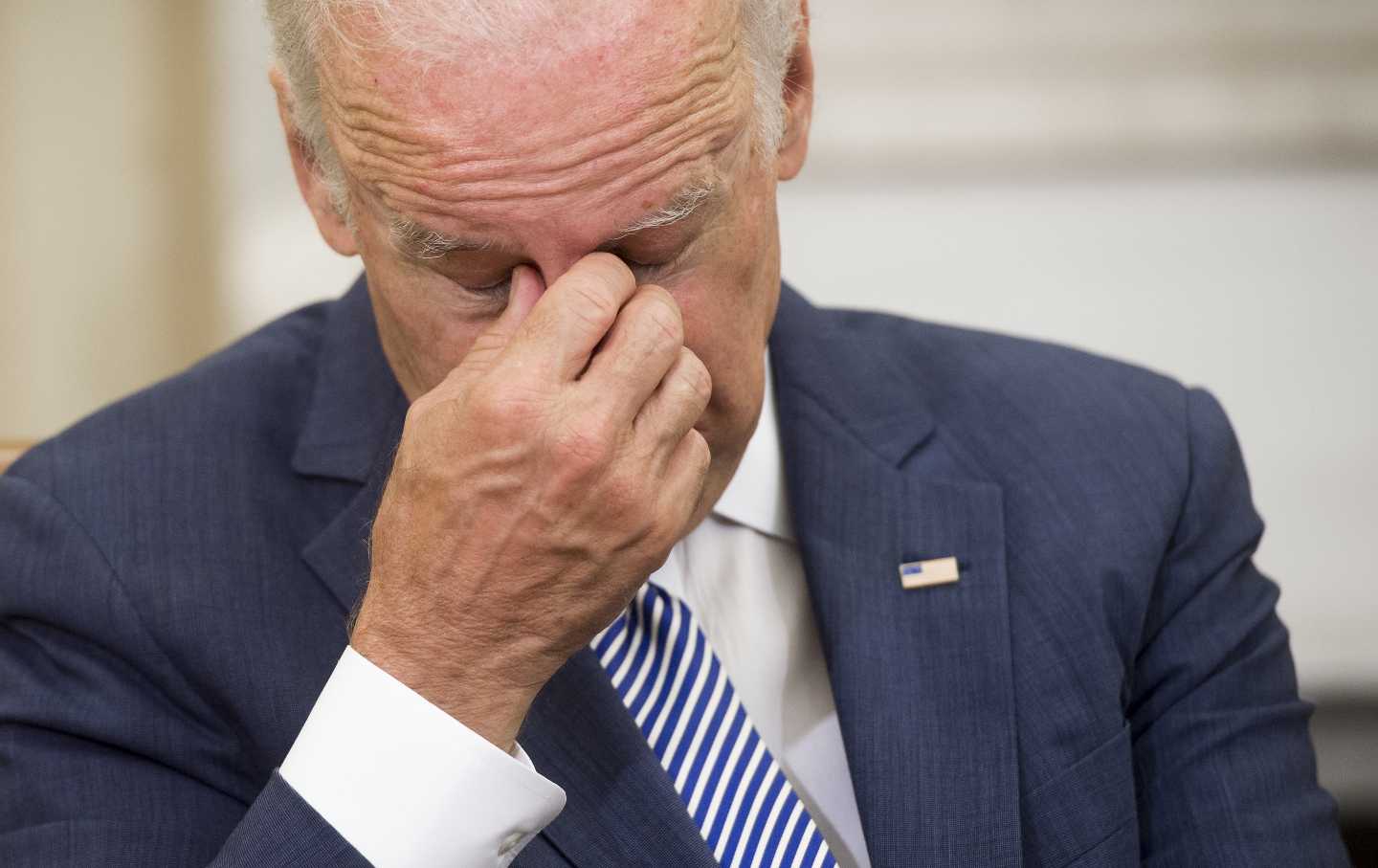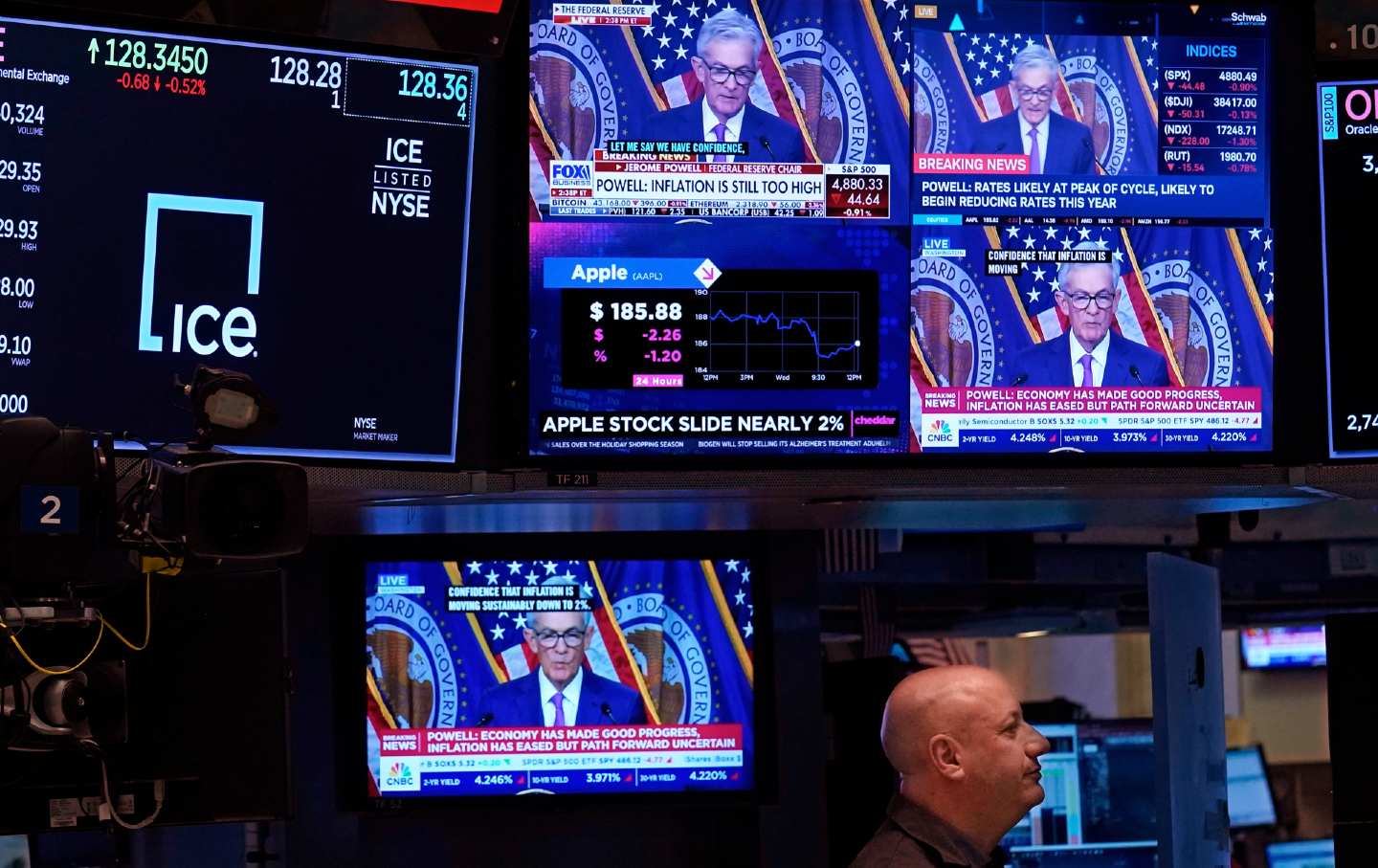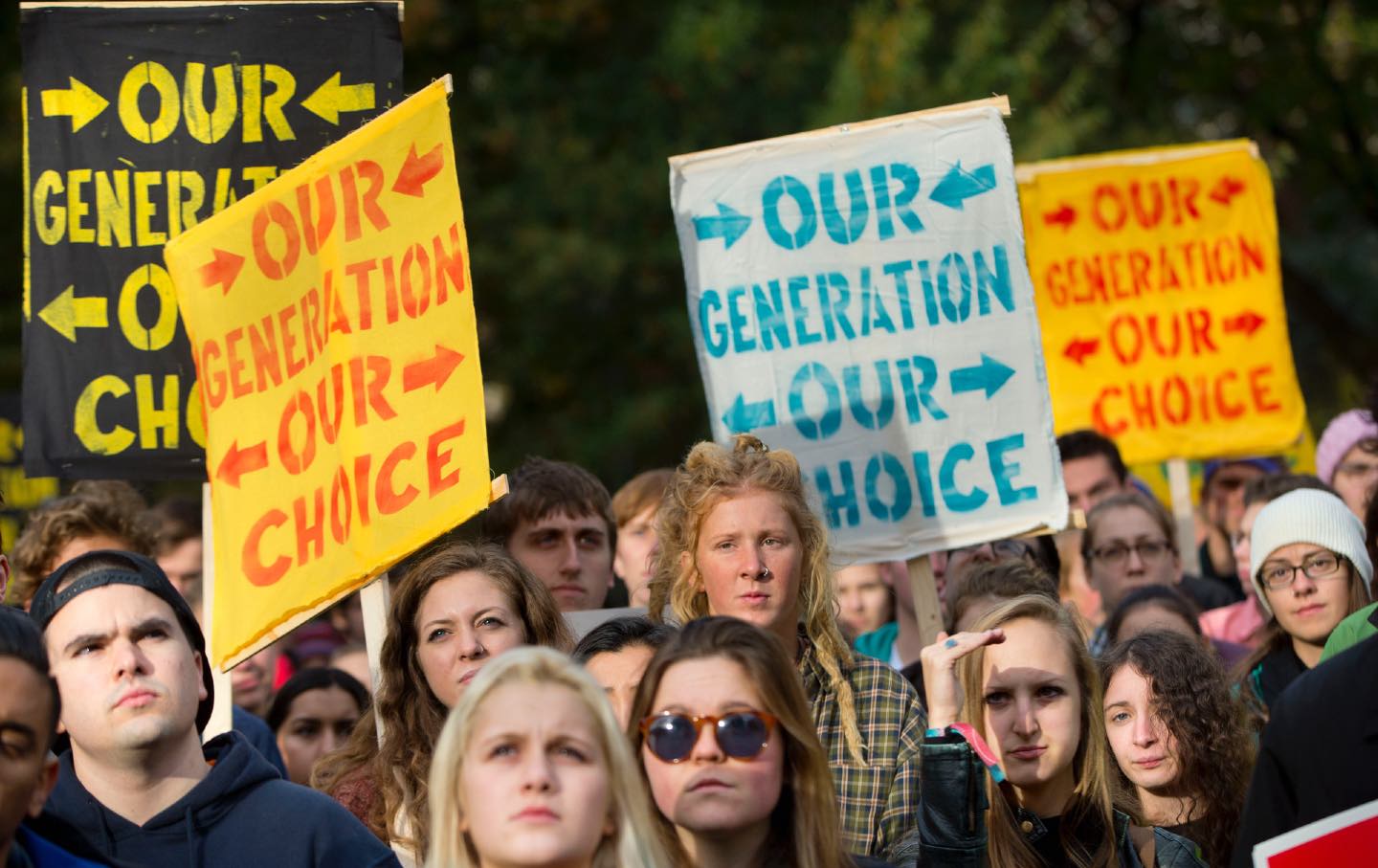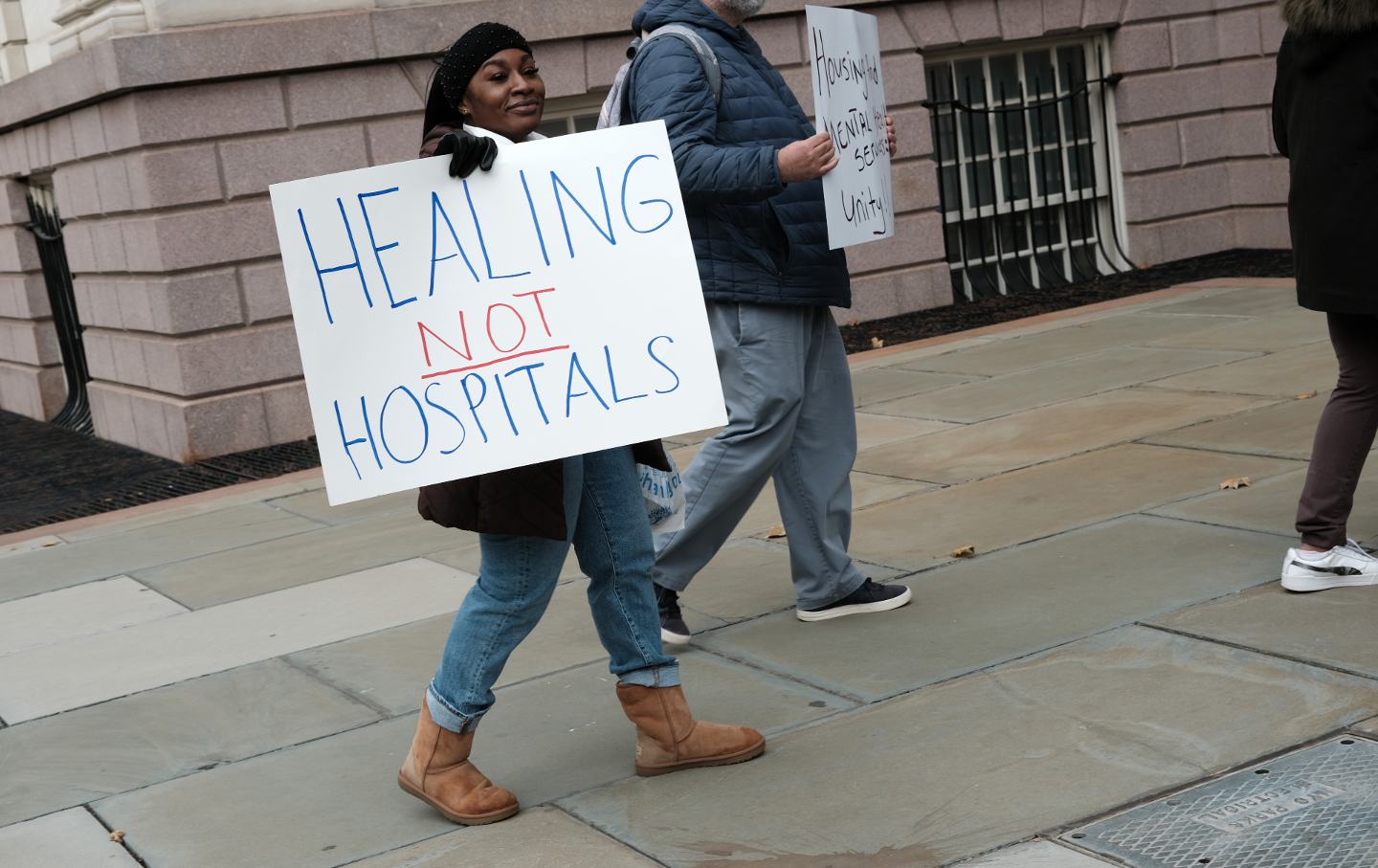Should Biden Drop Out?
Two writers look at the evidence come to different conclusions about the president’s reelection prospects.

Yes!
This November, for the second time in three election cycles, the US voting public will probably be forced to choose between two of the country’s least-liked, most-distrusted politicians. It was this same dynamic that led to the narrow defeat of Hillary Clinton at the hands of Donald Trump in 2016, and all signs indicate that if the election were held tomorrow, it would end the same way: with Trump in the White House.
Don’t let the spurt of pro-Biden hype after the State of the Union address fool you. Trump is currently in the strongest position of his political career. Biden, long broadly unpopular, has recently sunk to all-time approval lows, and it has allowed his opponent to break through the public’s distaste for him. At the time of this writing, Trump hasn’t trailed in national polling since September. He also has an advantage—a commanding advantage, in some cases—in every swing state that Biden won in 2020. There’s no way to sugarcoat it: Biden isn’t just on track to lose. He’s on track to lose badly, and nothing that he or his campaign has done over the past six months has improved the situation.
It’s a harrowing set of circumstances. Fortunately, the culprit behind it is obvious: Joe Biden himself. Some may dispute this, because they either don’t want to believe it is the case or don’t want to reckon with the implications of the liberal establishment presenting us with a defective nominee. We have a lot of information on public opinion regarding this election, and it overwhelmingly supports the conclusion that Biden is a uniquely poor candidate.
Democratic Senate candidates, both incumbent and non-incumbent, are outpolling the president across the country. Compared to his party’s showing in generic congressional ballot polls, he also tends to underperform, which wasn’t the case in 2020. While some may point to national polls showing that younger, mainstream liberal alternatives—say, Governor Gretchen Whitmer of Michigan—fare poorly in matchups with Trump, this is clearly a result of their lack of name recognition. In polls that test an alternative Democrat against Trump in states where said alternative Democrat is known—say, Whitmer in Michigan—the candidate substantially outpolls the current president, leading Trump in the same surveys that show Biden behind.
Simply put, most Americans, after four years of Trump and nearly two years after the Supreme Court’s Dobbs decision, want to vote for Democrats. They just don’t want to vote for one particular 81-year-old Democrat whom they largely regard as too old to serve effectively. It’s hard not to think that any alternative would be better.
Even Vice President Kamala Harris.
While some of Biden’s staunchest defenders may admit that the president is not the optimal candidate this year, they justify his nomination by arguing that Harris, his most likely successor, would be even worse. For a long time, I agreed with this, and I still might agree with it if I thought that Biden’s poor polling numbers were the only thing holding him back. But a series of recent stories indicate an even more worrying possibility: Biden’s problems might not just be limited to voter perceptions of him; he could very well be too stubborn to lead the kind of campaign that could assuage such concerns.
Just look at the December New York magazine article on Biden’s campaign, which presented the picture of an operation that’s less concerned about losing the election than it is about the media reporting on its poor polling numbers. Read the New Yorker article from March in which his chief of staff tried to argue that Biden wasn’t in a bubble because he speaks with people like the disgraced economist Larry Summers, the billionaire-by-marriage New York Times columnist Thomas Friedman, and the GOP Senate minority leader Mitch McConnell. Consider that even a favorable biographer like Franklin Foer wrote that Biden regards his own presidency as the realization of a decades-old “revenge fantasy” that he has harbored against “Washington’s liberal elite.” Despite everything that’s on the line, Biden and his team seem happier to lose if it means they get to do things “their way” than to win by adjusting what they do in a way that would vindicate their imagined haters.
It’s for this reason that Harris looks appealing. While her polling numbers may be worse than Biden’s right now, she’s gone out of her way to let people know she rejects the siege mentality of the rest of the administration. It’s not for nothing that her allies have made it clear to the media that she desires a shift in messaging on everything from abortion to Gaza. Harris may not be a popular politician, but she appears to have a basic understanding of the moment that her boss and his team lack. Unless and until Biden decides to stop letting his own arrogance drive him off a cliff, his vice president is and will continue to be the better option to keep Trump out of the White House.
Joshua A. Cohen
No!
Hell no, Joe Biden should not drop out of the presidential race. The fears about the president’s reelection prospects—only somewhat alleviated by his excellent State of the Union address—are unsupported by the evidence. The most important electoral indicators show that Biden is actually the front-runner in 2024.
Three fundamental factors tilt the electoral battlefield in Biden’s favor. Let’s take each in turn.
§ The Vitality of the Economy: Almost everyone agrees that the state of the economy can be decisive in an election year. Confounding earlier expectations of an impending recession, the economy is remarkably strong, and the financial situation of most Americans has improved over the past couple of years. More than 14 million jobs have been created or restored since 2021, and unemployment is at a near 50-year low of 3.9 percent. The inflation rate has been cut in half, and economic growth is robust. The economist Paul Krugman wrote recently that “the economic news in 2023 was almost miraculously good,” adding in another article that “inflation has plunged…even as the economy has boomed, with real G.D.P. rising 3.1 percent and employment rising by 2.9 million.” These underlying factors have helped propel the stock market to record highs, swelling the retirement accounts of workers across the country by an average of $10,000, according to an analysis by Fidelity Investments.
§ The Changing Composition of the Electorate: One of the main reasons many analysts and journalists fail to accurately assess elections today is that they have an antiquated understanding of the modern-day electorate. The composition of the population has changed over the past 50 years, producing a new electoral formula for victory.
People of color have grown from 12 percent of the population in the 1960s to 41 percent today, according to the latest US Census data. The majority of children under 18—and hence the majority of those who will become eligible to vote every year—are people of color.
Given that fomenting white racial resentment is the leading Republican strategy, it should come as no surprise that people of color overwhelmingly support Democratic candidates. According to the exit polls, two-thirds of voters of color backed Democrats in both the 2020 presidential election and the 2022 midterms.
In a country undergoing a demographic revolution, no candidate steps into the same electoral river twice, and this augurs well for the president’s prospects. There are 16 million new eligible voters since Biden’s last election, and about half of them are people of color.
Popular
“swipe left below to view more authors”Swipe →Much of the prevalent pessimism stems from the outsize attention given to polls by white pollsters showing a perceived slippage of support for Democrats among voters of color. All recent election results, however, affirm continued solid support from these same voters.
In the 2022 elections, Democrats received the support of 86 percent of Black voters and 60 percent of Latino voters. Just five months ago, Ohio’s vote on a Democratic-sponsored pro-choice ballot measure garnered the support of 83 percent of Black voters and 74 percent of Latinos.
§ The Shrinking Significance of Swing Voters: A critical third reality benefiting Biden is the shrinking number of people who are swing voters. Many analysts maintain that a large number of voters may swing their allegiance to the Republicans. Such an assumption is contradicted by both ample empirical data and common sense.
The gold-standard measure of voter behavior is the American National Election Studies, a collaboration between the University of Michigan and Stanford University that uses data collected over several decades. The ANES has found a clear trend that swing voters are virtually disappearing from the populace.
When Patrick Murray, the director of Monmouth University’s polling institute, was asked who the swing voters are in 2024, he amusingly and accurately responded, “You want me to name them individually? Because I probably could at this point.”
In terms of Biden’s admittedly low approval ratings, it is important to understand two facts: First, a large percentage of the country is implacably opposed to anything he does. Second, a percentage of those who disapprove of Biden’s performance are people of color and progressives who feel that the White House is too timid. The idea that people who want Biden to fight harder for racial justice would express their displeasure by voting for Donald Trump is nonsensical.
Biden said in 2020 that he was a generational bridge for the country. We’re far from settled on what’s next and who’s next. The movement could use four years to sort—and fight—that out.
For 2024, my three-word mantra is: “Run, Joe, run.”
Steve Phillips








